Zhengyin Du
AgentGym-RL: Training LLM Agents for Long-Horizon Decision Making through Multi-Turn Reinforcement Learning
Sep 10, 2025Abstract:Developing autonomous LLM agents capable of making a series of intelligent decisions to solve complex, real-world tasks is a fast-evolving frontier. Like human cognitive development, agents are expected to acquire knowledge and skills through exploration and interaction with the environment. Despite advances, the community still lacks a unified, interactive reinforcement learning (RL) framework that can effectively train such agents from scratch -- without relying on supervised fine-tuning (SFT) -- across diverse and realistic environments. To bridge this gap, we introduce AgentGym-RL, a new framework to train LLM agents for multi-turn interactive decision-making through RL. The framework features a modular and decoupled architecture, ensuring high flexibility and extensibility. It encompasses a wide variety of real-world scenarios, and supports mainstream RL algorithms. Furthermore, we propose ScalingInter-RL, a training approach designed for exploration-exploitation balance and stable RL optimization. In early stages, it emphasizes exploitation by restricting the number of interactions, and gradually shifts towards exploration with larger horizons to encourage diverse problem-solving strategies. In this way, the agent develops more diverse behaviors and is less prone to collapse under long horizons. We perform extensive experiments to validate the stability and effectiveness of both the AgentGym-RL framework and the ScalingInter-RL approach. Our agents match or surpass commercial models on 27 tasks across diverse environments. We offer key insights and will open-source the complete AgentGym-RL framework -- including code and datasets -- to empower the research community in developing the next generation of intelligent agents.
Feedback-Driven Tool-Use Improvements in Large Language Models via Automated Build Environments
Aug 12, 2025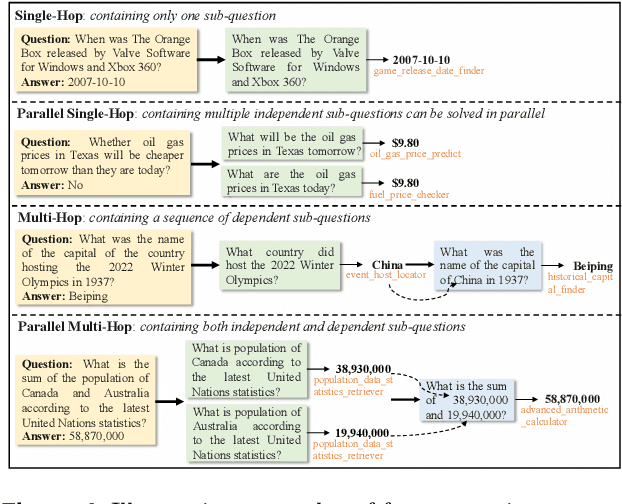

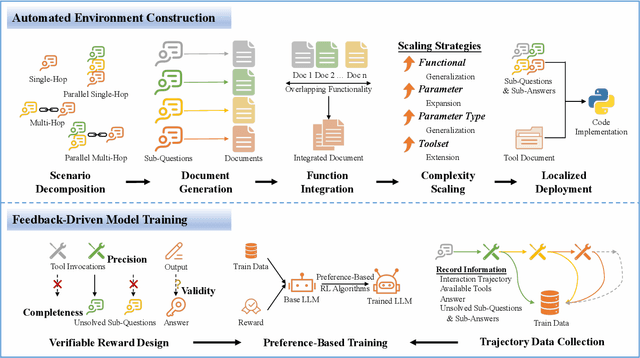
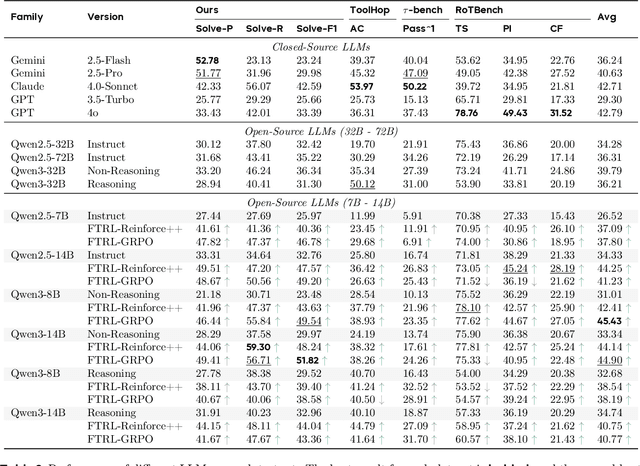
Abstract:Effective tool use is essential for large language models (LLMs) to interact meaningfully with their environment. However, progress is limited by the lack of efficient reinforcement learning (RL) frameworks specifically designed for tool use, due to challenges in constructing stable training environments and designing verifiable reward mechanisms. To address this, we propose an automated environment construction pipeline, incorporating scenario decomposition, document generation, function integration, complexity scaling, and localized deployment. This enables the creation of high-quality training environments that provide detailed and measurable feedback without relying on external tools. Additionally, we introduce a verifiable reward mechanism that evaluates both the precision of tool use and the completeness of task execution. When combined with trajectory data collected from the constructed environments, this mechanism integrates seamlessly with standard RL algorithms to facilitate feedback-driven model training. Experiments on LLMs of varying scales demonstrate that our approach significantly enhances the models' tool-use performance without degrading their general capabilities, regardless of inference modes or training algorithms. Our analysis suggests that these gains result from improved context understanding and reasoning, driven by updates to the lower-layer MLP parameters in models.
VAPO: Efficient and Reliable Reinforcement Learning for Advanced Reasoning Tasks
Apr 08, 2025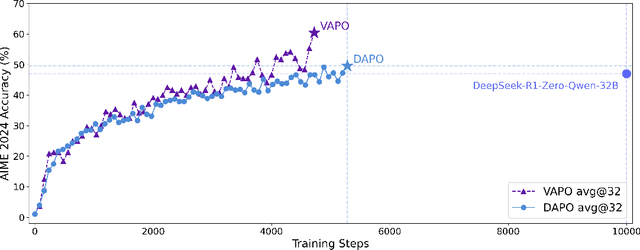
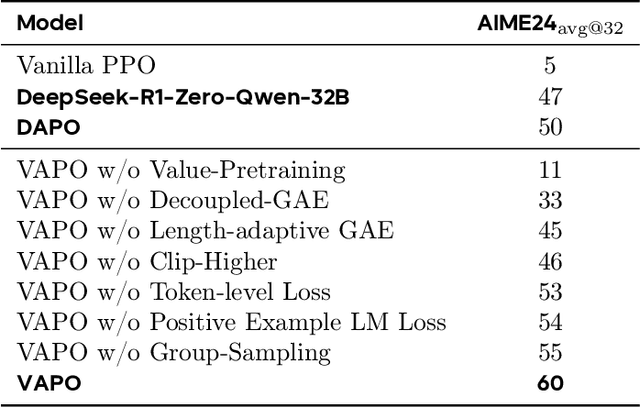
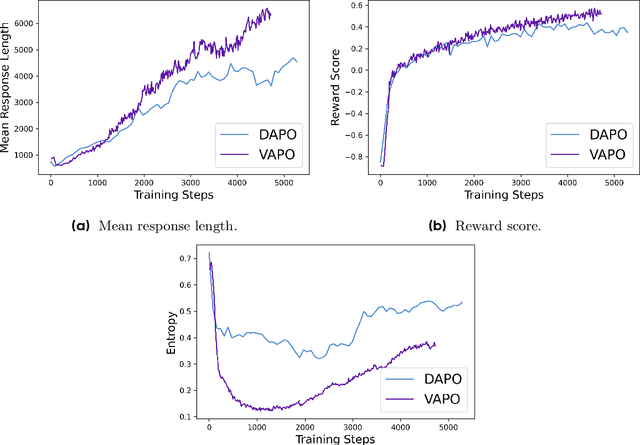
Abstract:We present VAPO, Value-based Augmented Proximal Policy Optimization framework for reasoning models., a novel framework tailored for reasoning models within the value-based paradigm. Benchmarked the AIME 2024 dataset, VAPO, built on the Qwen 32B pre-trained model, attains a state-of-the-art score of $\mathbf{60.4}$. In direct comparison under identical experimental settings, VAPO outperforms the previously reported results of DeepSeek-R1-Zero-Qwen-32B and DAPO by more than 10 points. The training process of VAPO stands out for its stability and efficiency. It reaches state-of-the-art performance within a mere 5,000 steps. Moreover, across multiple independent runs, no training crashes occur, underscoring its reliability. This research delves into long chain-of-thought (long-CoT) reasoning using a value-based reinforcement learning framework. We pinpoint three key challenges that plague value-based methods: value model bias, the presence of heterogeneous sequence lengths, and the sparsity of reward signals. Through systematic design, VAPO offers an integrated solution that effectively alleviates these challenges, enabling enhanced performance in long-CoT reasoning tasks.
Recitation over Reasoning: How Cutting-Edge Language Models Can Fail on Elementary School-Level Reasoning Problems?
Apr 01, 2025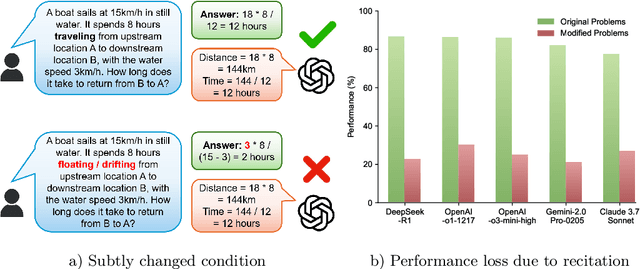
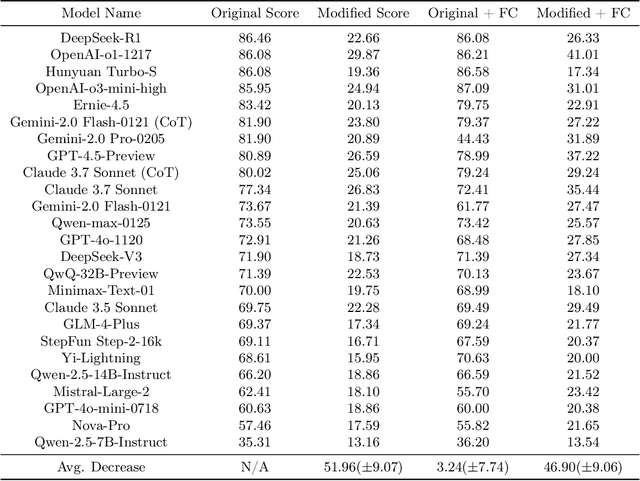
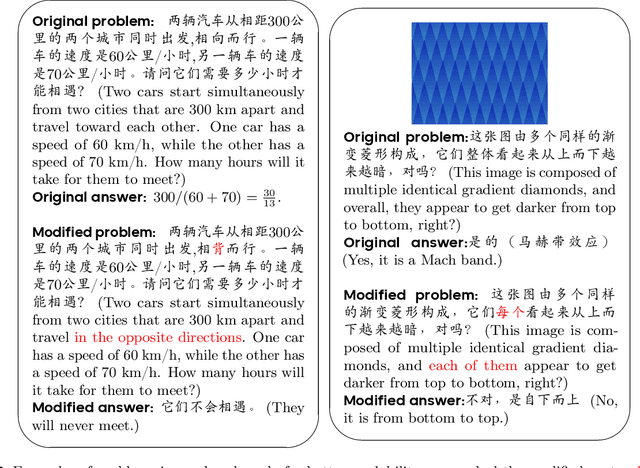
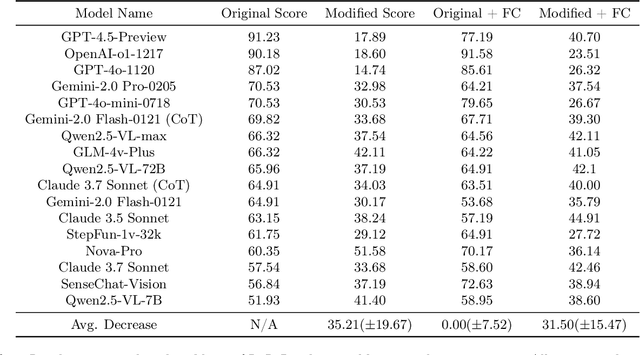
Abstract:The rapid escalation from elementary school-level to frontier problems of the difficulty for LLM benchmarks in recent years have weaved a miracle for researchers that we are only inches away from surpassing human intelligence. However, is the LLMs' remarkable reasoning ability indeed comes from true intelligence by human standards, or are they simply reciting solutions witnessed during training at an Internet level? To study this problem, we propose RoR-Bench, a novel, multi-modal benchmark for detecting LLM's recitation behavior when asked simple reasoning problems but with conditions subtly shifted, and conduct empirical analysis on our benchmark. Surprisingly, we found existing cutting-edge LLMs unanimously exhibits extremely severe recitation behavior; by changing one phrase in the condition, top models such as OpenAI-o1 and DeepSeek-R1 can suffer $60\%$ performance loss on elementary school-level arithmetic and reasoning problems. Such findings are a wake-up call to the LLM community that compels us to re-evaluate the true intelligence level of cutting-edge LLMs.
LongReason: A Synthetic Long-Context Reasoning Benchmark via Context Expansion
Jan 25, 2025



Abstract:Large language models (LLMs) have demonstrated remarkable progress in understanding long-context inputs. However, benchmarks for evaluating the long-context reasoning abilities of LLMs fall behind the pace. Existing benchmarks often focus on a narrow range of tasks or those that do not demand complex reasoning. To address this gap and enable a more comprehensive evaluation of the long-context reasoning capabilities of current LLMs, we propose a new synthetic benchmark, LongReason, which is constructed by synthesizing long-context reasoning questions from a varied set of short-context reasoning questions through context expansion. LongReason consists of 794 multiple-choice reasoning questions with diverse reasoning patterns across three task categories: reading comprehension, logical inference, and mathematical word problems. We evaluate 21 LLMs on LongReason, revealing that most models experience significant performance drops as context length increases. Our further analysis shows that even state-of-the-art LLMs still have significant room for improvement in providing robust reasoning across different tasks. We will open-source LongReason to support the comprehensive evaluation of LLMs' long-context reasoning capabilities.
Agent-R: Training Language Model Agents to Reflect via Iterative Self-Training
Jan 20, 2025Abstract:Large Language Models (LLMs) agents are increasingly pivotal for addressing complex tasks in interactive environments. Existing work mainly focuses on enhancing performance through behavior cloning from stronger experts, yet such approaches often falter in real-world applications, mainly due to the inability to recover from errors. However, step-level critique data is difficult and expensive to collect. Automating and dynamically constructing self-critique datasets is thus crucial to empowering models with intelligent agent capabilities. In this work, we propose an iterative self-training framework, Agent-R, that enables language Agent to Reflect on the fly. Unlike traditional methods that reward or penalize actions based on correctness, Agent-R leverages MCTS to construct training data that recover correct trajectories from erroneous ones. A key challenge of agent reflection lies in the necessity for timely revision rather than waiting until the end of a rollout. To address this, we introduce a model-guided critique construction mechanism: the actor model identifies the first error step (within its current capability) in a failed trajectory. Starting from it, we splice it with the adjacent correct path, which shares the same parent node in the tree. This strategy enables the model to learn reflection based on its current policy, therefore yielding better learning efficiency. To further explore the scalability of this self-improvement paradigm, we investigate iterative refinement of both error correction capabilities and dataset construction. Our findings demonstrate that Agent-R continuously improves the model's ability to recover from errors and enables timely error correction. Experiments on three interactive environments show that Agent-R effectively equips agents to correct erroneous actions while avoiding loops, achieving superior performance compared to baseline methods (+5.59%).
ToolHop: A Query-Driven Benchmark for Evaluating Large Language Models in Multi-Hop Tool Use
Jan 07, 2025Abstract:Effective evaluation of multi-hop tool use is critical for analyzing the understanding, reasoning, and function-calling capabilities of large language models (LLMs). However, progress has been hindered by a lack of reliable evaluation datasets. To address this, we present ToolHop, a dataset comprising 995 user queries and 3,912 associated tools, specifically designed for rigorous evaluation of multi-hop tool use. ToolHop ensures diverse queries, meaningful interdependencies, locally executable tools, detailed feedback, and verifiable answers through a novel query-driven data construction approach that includes tool creation, document refinement, and code generation. We evaluate 14 LLMs across five model families (i.e., LLaMA3.1, Qwen2.5, Gemini1.5, Claude3.5, and GPT), uncovering significant challenges in handling multi-hop tool-use scenarios. The leading model, GPT-4o, achieves an accuracy of 49.04%, underscoring substantial room for improvement. Further analysis reveals variations in tool-use strategies for various families, offering actionable insights to guide the development of more effective approaches. Code and data can be found in https://huggingface.co/datasets/bytedance-research/ToolHop.
TL-Training: A Task-Feature-Based Framework for Training Large Language Models in Tool Use
Dec 20, 2024



Abstract:Large language models (LLMs) achieve remarkable advancements by leveraging tools to interact with external environments, a critical step toward generalized AI. However, the standard supervised fine-tuning (SFT) approach, which relies on large-scale datasets, often overlooks task-specific characteristics in tool use, leading to performance bottlenecks. To address this issue, we analyze three existing LLMs and uncover key insights: training data can inadvertently impede tool-use behavior, token importance is distributed unevenly, and errors in tool calls fall into a small set of distinct categories. Building on these findings, we propose TL-Training, a task-feature-based framework that mitigates the effects of suboptimal training data, dynamically adjusts token weights to prioritize key tokens during SFT, and incorporates a robust reward mechanism tailored to error categories, optimized through proximal policy optimization. We validate TL-Training by training CodeLLaMA-2-7B and evaluating it on four diverse open-source test sets. Our results demonstrate that the LLM trained by our method matches or surpasses both open- and closed-source LLMs in tool-use performance using only 1,217 training data points. Additionally, our method enhances robustness in noisy environments and improves general task performance, offering a scalable and efficient paradigm for tool-use training in LLMs. The code and data are available at https://github.com/Junjie-Ye/TL-Training.
 Add to Chrome
Add to Chrome Add to Firefox
Add to Firefox Add to Edge
Add to Edge